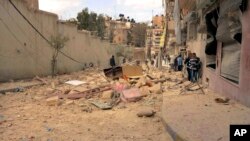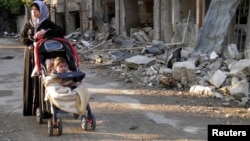The U.N. Office for the Coordination of Humanitarian Affairs (OCHA) reports living conditions inside war-torn Syria continue to deteriorate, leading to a dramatic rise in the number of people in need of protection and humanitarian assistance.
OCHA reports some 13.5 million people inside Syria, nearly half of them children, are living on the margins of existence. This is an increase of 1.2 million people in just 10 months. It says the vast majority of these people are unable to get health care or enough food to stave off hunger.
The U.N. agency says 6.5 million of these people are internally displaced. Many of those who have been forced to flee their homes because of the fighting have had to move within the country several times.
The U.N. reports more than 4.2 million other Syrians are refugees, mainly in neighboring countries.
OCHA spokesman Jens Laerke said aid agencies are unable to access many of these desperately needy people.
“There are 4.5 million people in hard to reach areas and we, the U.N., is able to reach only a small fraction of those people as a result of the active conflict, shifting frontlines, bureaucratic hurdles, and conditions imposed by the parties,” Laerke said.
Of those who are in hard-to-reach areas, Laerke said almost 400,000 are living under siege. He said about one half of them are living in Deir ez Zour city, which is under control of Islamic State extremists.
The spokesman says the rest of this besieged population lives in areas under the control of the Syrian government, various rebel groups and al-Qaida linked Nusrah Front militants.
So far this year, Laerke said, the U.N. has been able to provide health care to only 3.6 percent of the people under siege, and food to only one half of one percent.
He told VOA the U.N. has made 85 convoy requests for delivery of cross border humanitarian aid. But, he said the Syrian Ministry of Foreign Affairs has granted only 23 of these requests.
“Less than half of those which was approved have been able to actually proceed due to a combination of lack of final security clearances from the authorities, lack of safe passage from non-state armed opposition groups and general insecurity,” he said.
Laerke said the situation has eased somewhat in Syria’s Aleppo governorate. He said 26,500 people in the twin towns of Nubul and Zahra are no longer considered besieged following credible reports that the movement of commercial goods has improved. But, he added access and protection concerns remain acute.





